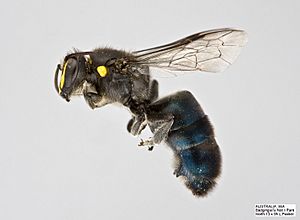Banksia bee facts for kids
Quick facts for kids Banksia bee |
|
|---|---|
 |
|
| Hylaeus alcyoneus Male | |
| Scientific classification |
|
| Kingdom: | Animalia |
| Phylum: | Arthropoda |
| Class: | Insecta |
| Order: | Hymenoptera |
| Family: | Colletidae |
| Genus: | Hylaeus |
| Species: |
H. alcyoneus
|
| Binomial name | |
| Hylaeus alcyoneus Erichson, 1842
|
|
| Script error: The function "autoWithCaption" does not exist. | |
Script error: No such module "Check for conflicting parameters".
The banksia bee (scientific name: Hylaeus alcyoneus) is a special type of bee that lives only in Australia. You can often find it in the coastal heath areas of eastern and southern Western Australia. This bee is super important because it helps to pollinate many different kinds of Banksia plants.
A German bug expert named Wilhelm Ferdinand Erichson first described this bee in 1842. Its scientific name, alcyoneus, comes from an old Greek word, halcyon, which means "kingfisher." This name was chosen because of the bee's pretty kingfisher-blue color.
Contents
What the Banksia Bee Looks Like
The banksia bee has a shiny, metallic blue body. It also has bright yellow marks on its face.
Big Differences Between Males and Females
One really interesting thing about banksia bees is how different the males and females are in size. This is called sexual dimorphism. For most other types of bees, the female bees are usually bigger than the males. But with banksia bees, the males are much larger than the females!
How Males Find Food
Male banksia bees of different sizes act differently when they are looking for food.
- Big males often sit on high Banksia flowers. They guard these flowers and feed there. If another male tries to take their spot, it's usually an even bigger male that can push them away.
- Small males tend to feed closer to the ground. They fly around to visit several flowers in a certain area.
Where Banksia Bees Live and What They Eat
Banksia bees are found in the coastal areas of eastern and southern Western Australia. They visit many different types of plants to find nectar and pollen.
Favorite Banksia Plants
Some of the Banksia plants that banksia bees visit in Western Australia include:
- Banksia ashbyi
- B. coccinea
- B. hookeriana
- B. ilicifolia
- B. menziesii
- B. prionotes
- B. sessilis
- B. speciosa
Other Plants They Visit
Banksia bees also visit other types of plants, such as:
- Allocasuarina campestris
- Grevillea cagiana
- G. eriostachya
- Isopogon dubius
- Different kinds of Xanthorrhoea plants.
Home Life of the Banksia Bee
Banksia bees build their nests inside hollow pieces of wood. A nest usually has several small spaces or "cells."
Building a Nest
For each cell, the parent bee collects food. This food is a mix of pollen and nectar. Then, the bee lays one single egg in that cell. This way, the young bee has food ready when it hatches.
Challenges for the Banksia Bee
The banksia bee faces a challenge from another type of bee. This is the European honey bee (Apis mellifera). European honey bees were brought to Australia by people.
Competition for Resources
In places where both banksia bees and European honey bees live, the banksia bee has fewer nests. This suggests that the European honey bee competes with the banksia bee for food and nesting spots.
 | James B. Knighten |
 | Azellia White |
 | Willa Brown |

